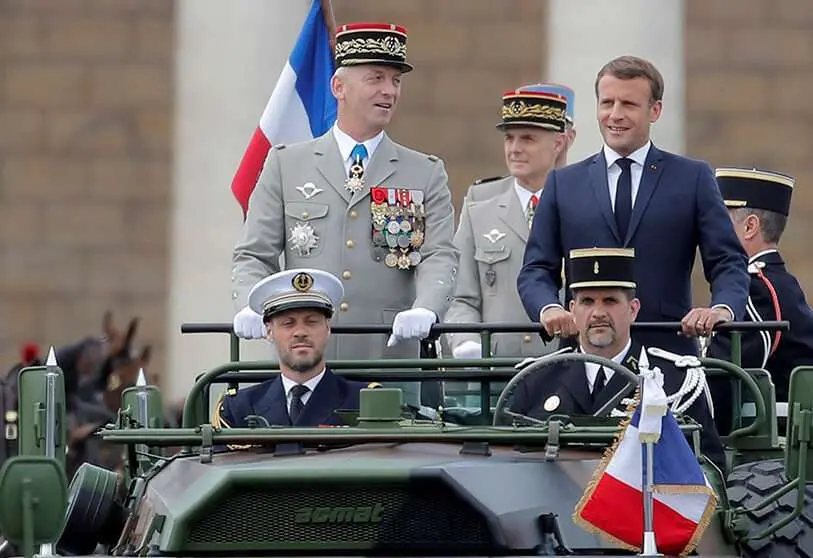Radical purge in the French Army

It is a full-fledged challenge to executive power. The letter which, on 14 April last, coinciding with the 60th anniversary of the uprising of four generals in Algiers against President Charles de Gaulle, was published by 18 active French military personnel, and backed at first by 1,500 signatures, which today exceeds 5,000, including 25 generals in the reserve, has provoked a reaction from the government of President Emmanuel Macron. Its current chief of staff, General François Lecointre, is demanding the definitive dismissal of several generals, and summoning the remaining officers to appear before a higher military court.
These generals belong to the so-called Second Section, a peculiarity unique to the French armed forces, created under the reign of Louis-Philippe in 1839. This is an intermediate step between active service and transfer to the reserves, and those in this situation can be reinstated at any time in command of combat units for reasons of war, health or disciplinary measures.
Although the missive, published in the traditionalist magazine Valeurs Actuelles, was initially intended to be muted, the event has only amplified to a strong level of internal confrontation within the army, while the political forces, far from showing a unanimous position, use the growing sabre rattling in a blatant attempt to put themselves at the forefront of the demonstration.
Defence minister Florence Parly called the letter "an insult launched at thousands of soldiers." But the leader of the National Rally (RN), Marine Le Pen, immediately tried to channel the anger towards her party, brazenly calling for a vote for her party "for embodying the concerns not only of the military but of a large part of the French people".
The "great mute", as the armed forces are popularly known in the French Republic, seems to want to speak out and make their voice heard, but it is clear that their voice is not unanimous among the military right now. According to political scientist Jerôme Fouquet in the online magazine L'Opinion, the letter published by the disgruntled soldiers "reveals the exasperation of a part of the army". He points out that 40 per cent of the soldiers who voted for Le Pen in the last elections, or doubled the overall electorate (21.3 per cent), have no reason to change their vote, and that their drift to the extreme right may be accentuated.
Unrest in the barracks began to escalate in July 2017, when the then chief of staff, General De Villiers, was forced to resign after he did not share President Macron's views on the supposedly accelerating dismemberment of France. The military officer, highly regarded among his peers, delivered a message that the 'rebels' have only endorsed: '[President Macron] has not properly measured the extent of the threat of France's collapse'.
The challenge has grown into the current situation, where the military letter in question speaks directly of the "collapse of the homeland" in the face of "Islamism" and the "hordes of criminals from the suburbs", hinting at the possibility of a coup d'état and civil war. The text is peremptory in nature: "We are at a serious moment. We are ready to uphold policies that safeguard the nation... and if no one acts, laxity will continue to take hold of our nation, ultimately provoking the intervention of our active comrades in a decisive and dangerous mission for the protection of the values of our civilisation".
The solution to this challenge, according to General François Lecointre, can only be "working against incurring radiation or disciplinary sanction, that is, the forced transfer to the reserve of the signatory generals". He is backed by the Prime Minister, Jean Castex, who unequivocally judges the attitude of the military rebels in their letter as "contrary to all republican principles", while calling Marine Le Pen's attempt to take political advantage of them "unacceptable". Lecointre reminds everyone that General Piquemal, who led anti-immigration demonstrations in 2016, has already been expelled from the army, making it clear that this harsh measure will be the one that will be signed by President Macron for those now charged.
This is not the first major purge the French army has faced since World War II. There were three very extensive ones between 1940 and 1966. The first, following the establishment of the collaborationist Vichy government; the second, between 1943 and the days after the Liberation, and the third, from the end of the Algerian war in 1962 until the eve of the bloodless revolution of May 1968. The main problem in tackling the current one is that it is not led by a leader of the prestige and stature of de Gaulle, both among the armed forces themselves and in civil society.



